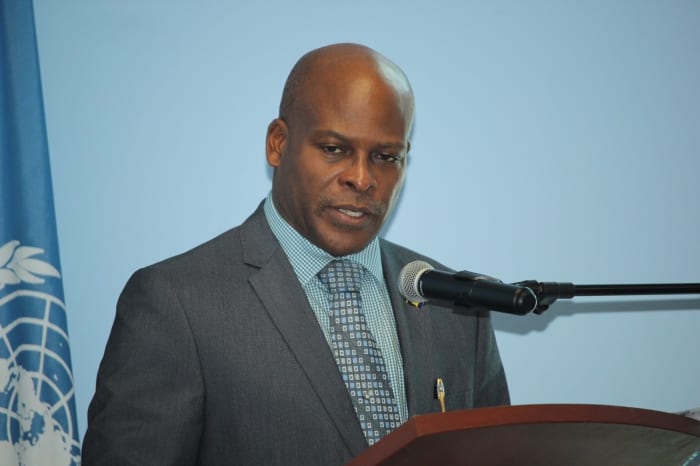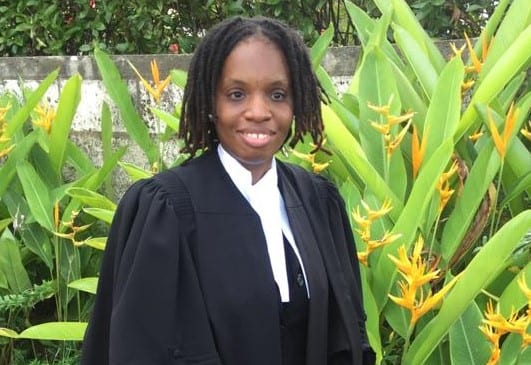
Barbados’ progress towards enhancing the lives of persons with disabilities (PWDs) was highlighted recently by three of the island’s advocates, who attended the 17th Session of the United Nations (UN) Conference of State Parties on the Convention on the Rights of Persons with Disabilities, at UN headquarters in New York, USA.
The trio, led by Disabilities Advocate and Chairman of the National Advisory Committee on Disabilities, Edmund Hinkson, included Disabilities Consultant to the Ministry of People Empowerment and Elder Affairs, Janeil Odle, and Director of the National Disabilities Unit (NDU), John Hollingsworth.
On return, the team provided an update to the Barbados Government Information Service (BGIS) about the event, held under the theme “Disabilities Inclusion” and bearing three sub-themes. These were: International Cooperation to Promote Technology Innovations and Transfer for an Inclusive Future; Persons with Disabilities in Situations of Risk and Humanitarian Emergencies; and Promoting the Rights of Persons with Disabilities to Decent Work and Sustainable Livelihood.
Mr. Hinkson said they focused on Barbados’ efforts at advancing inclusive education and training for PWDs. He stated that mention was also made of Barbados’ proposals under the National Policy for Training, aimed at reducing the 90 per cent unemployment rate for adult PWDs, against the backdrop that they are estimated at about seven per cent of the population, and detailed this country’s proposals to reduce the extremely high figure.
The delegation also addressed affirmative action principles and quota systems; creating an environment where PWDs can gain more affordable and accessible health care; providing access to both the built and natural environment; transportation, and greater participation in the socio-economic aspects of life in Barbados.
Mr. Hinkson expressed the hope that the National Policy on Disabilities and associated draft legislation on the Rights of Persons with Disabilities would be passed in Parliament by year-end. He stressed the need for these two documents to facilitate those with disabilities and reduce insensitivity across the board.
“Government can put policies in place, but it has to be an all of Barbados approach. And yes, there are many employers in the private sector who do not want to employ people with disabilities. They may get through the door in an accepted interview based on their CV – well qualified, can do the job – but then when a lot of persons who are on interviewing panels see that they may have immobility, they won’t employ them because it might mean retrofitting their place,” remarked Mr. Hinkson.
However, he contended that COVID-19 had shown that remote work was the way forward and for PWDs the necessary adjustments could be made. “What is wrong with adjusting your workstation or place to accommodate a person with a disability? We have persons with disabilities all over the world,” he said.

Ms. Odle noted that Barbados had “been making a lot of steps lately” but stressed there was “a lot further to go”. She added: “Ninety per cent of persons with disabilities are unemployed…. Every 10 persons with disabilities do not have a job and do not have their own income, which means that we are left to depend on either the government or our family members.
“And that stems from the fact that persons with disabilities, traditionally, did not have the same access to equal and equitable education. So, one thing that we have to look to is inclusive and equitable education, where persons with disabilities can have the same access to the same education system and employment and that will open a lot more doors.”
Meanwhile, Mr. Hollingsworth called for an intensive public awareness campaign, supported by the private sector, to alert the general population about the needs of PWDs.
“We still have these archaic ways where some employers may believe that some work is beyond the capacity of persons with disabilities; they may have to make some adjustments in order to accommodate them, but it is not necessarily beyond the work of persons with disabilities.”
As it relates to the built environment, he said persons must consider those who are hearing impaired, the deaf, and hard of hearing.
“For instance, as it relates to Hurricane Beryl, we would have liked a situation where there could have been alerts translated into sign language by the sign language interpreters to reach those persons who are hearing impaired a lot better. Signage is very critical because without being able to know what is going on, they could place themselves at great risk,” he stated.
The NDU Director also called for the involvement of children in projects and programmes, something he noted was ventilated at the UN conference, and must be adopted in Barbados.
“Children are very influential; they seek to implement programmes and policies, not only for persons with disabilities. They are the future, and they implement policies and ideas more so readily than the older population,” he stressed.
The UN forum also provided the team with the opportunity to hear what the other 190 out of 191 member states of the United Nations, which have signed on to the Convention on the Rights of Persons with Disabilities Act 2007, were doing and had achieved.
